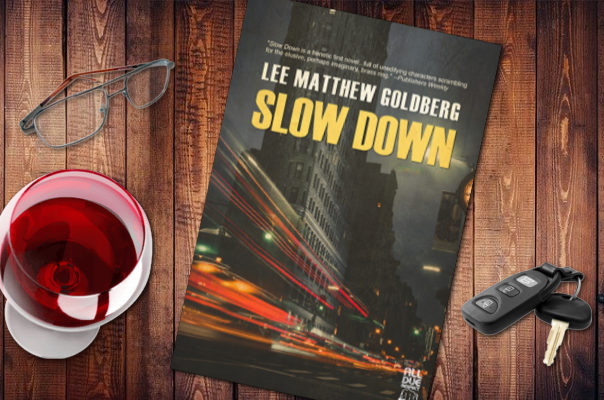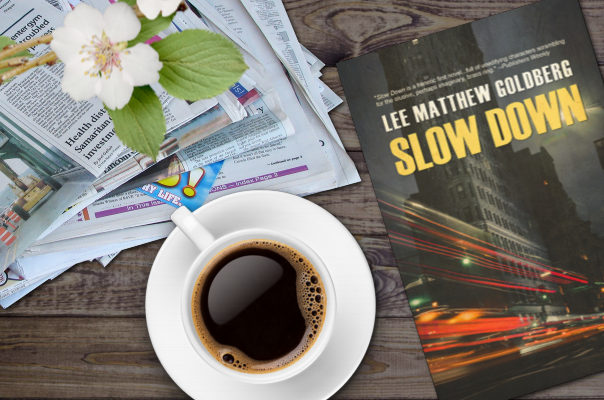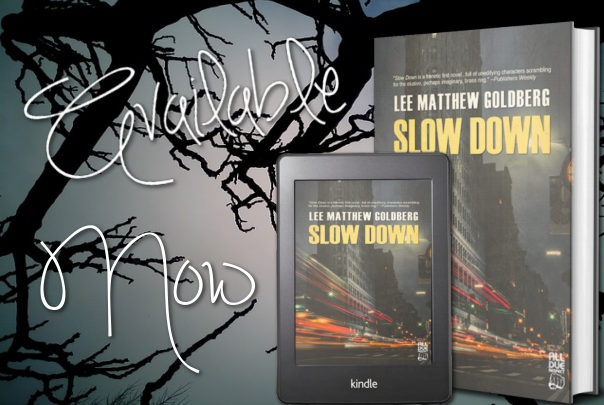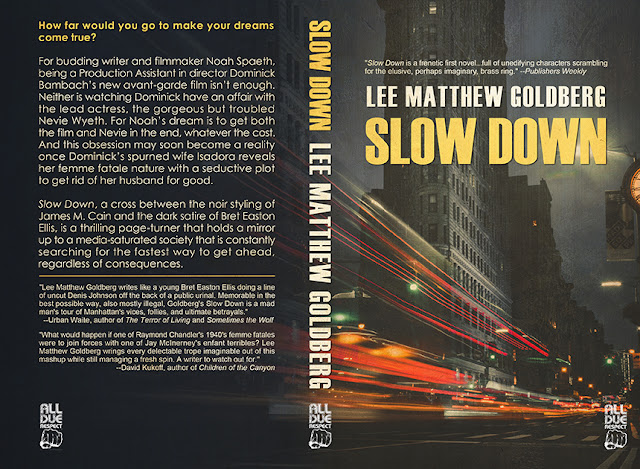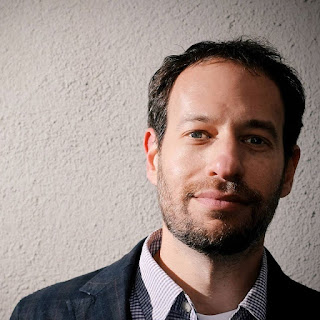By Lee Matthew Goldberg
Thriller/Noir
How far would you go to make your dreams come true? For budding writer and filmmaker Noah Spaeth, being a Production Assistant in director Dominick’s Bambach’s new avant-garde film isn’t enough. Neither is watching Dominick have an affair with the lead actress, the gorgeous but troubled Nevie Wyeth. For Noah’s dream is to get both the film and Nevie in the end, whatever the cost. And this obsession may soon become a reality once Dominick’s spurned wife Isadora reveals her femme fatale nature with a seductive plot to get rid of her husband for good.
Slow Down, a cross between the noir styling of James M. Cain and the dark satire of Bret Easton Ellis, is a thrilling page-turner that holds a mirror up to a media-saturated society that is constantly searching for the fastest way to get ahead, regardless of consequences.
Here’s what readers are saying about Slow Down!
“Slow Down is a frenetic first novel…full of unedifying characters scrambling for the elusive, perhaps imaginary, brass ring.”—Publishers Weekly
“Lee Matthew Goldberg writes like a young Bret Easton Ellis doing a line of uncut Denis Johnson off the back of a public urinal. Memorable in the best possible way, also mostly illegal, Goldberg’s Slow Down is a mad man’s tour of Manhattan’s vices, follies, and ultimate betrayals.”
–Urban Waite, author of The Terror of Living and Sometimes the Wolf
“What would happen if one of Raymond Chandler’s 1940’s femme fatales were to join forces with one of Jay McInerney’s enfant terribles? Lee Matthew Goldberg wrings every delectable trope imaginable out of this mashup while still managing a fresh spin. A writer to watch out for.”
–David Kukoff, author of Children of the Canyon
“Slow Down starts fast and gets faster quick, gunning through yellow streetlights on its way to a full collision with your shattered soul. Lee Matthew Goldberg takes on the American Zeitgeist in this stunning debut.”
–Stephen Jay Schwartz, LA Times bestselling author of Boulevard and Beat
“Slow Down is a brilliant rush of a work charting the rise and fall of Noah and other pretentious losers. Savor this book.”
—Foreword Reviews
“Dark and hard-boiled writing that grabs you by the throat. Slow Down is one of those rare novels that’s so good you want it to go on forever!”
–Nick Pengelley, author of Ryder: An Ayesha Ryder Novel
“The plot takes off…there’s no denying it’s fun to watch rich snots destroy themselves.”
—Booklist
“Goldberg’s portrayal of the New York demimonde is one of the book’s strengths and brings to mind Bret Easton Ellis’ Less Than Zero. He also succeeds in marshalling a complicated plot.”
—CrimeFictionLover.com
ORDER YOUR COPY
Amazon → https://amzn.to/3dmv8UU
CHAPTER ONE
THE STEPS THAT LEAD ME TO MY CATACLYSMIC ENCOUNTER WITH DOMINICK BAMBACH WERE PUT IN MOTION TWO DAYS EARLIER WHEN I GOT THE NEWS ABOUT BEING DOUBLE-FIRED FROM MY SOULSUCKING JOB. Ah, Classic Screw-Up Noah. I’d come home a little buzzed from a Yankees game to hear my parents’ cook, Consuela, shouting from room to room trying to find me. Since my parents’ place was big enough to get legitimately lost in, I had no clue where she was, but I did run into my brother Dex ripping bong hits on our wraparound terrace.
“That mad Guatemalan woman has been huffing and puffing around the apartment for over half an hour,” Dex said.
“Is she okay?”
“Importante!” Dex mimicked, rather poorly, sounding more stereotypically Asian than stereotypically Spanish. “Más importante, señor Noah. Su jefe llamando! Your boss called!”
I caught up with Consuela in what my parents dubbed their “Conservatory,” named with pretension like we all lived inside the game of Clue. Actually, it was a shoebox of a room that had wedged in a piano, a piano bench, and a rather spectacular view of Central Park. I found Consuela perched on the window seat, hands folded in her apron like she was praying, breaths heavy and sad. She was a whale and I had made her sweat.
“Señor Noah. Oh, señor Noah,” Consuela heaved, the life drained out of her, ready for her deathbed. “Message for you.”
She had written the message in Spanglish on a post-it stuck Slow Down
to her large left breast. She displayed it to me like it was a medal of honor. It also had a blob of her famous Diablo sauce and basically said that my jefe sounded muy angry and would call my cell at nine tomorrow morning.
My father had adopted Consuela fifteen years ago, a rotund woman who fancied spiced rum and sour looks. My parents had met her during one of their “slumming vacations”—meaning a stay anywhere in the Third World, even if they shelled out for five-star hotels. This time it had been in Guatemala, where she was an overworked cook who made delectable tamales at the breakfast buffet. After one bite of her tasty creations, they whisked her back to the States as their latest charity case. But my father, all red nosed and with a jarring demeanor, had stated the real reason one night at a dinner party:
“You should see some of these people, just ghastly…” my father, a swirling glass of port in his hand, spouted to an audience of wondering blinks. I couldn’t stop looking at his blinding white teeth, which made him look demented. “That is where Consuela would still be if Janet and I hadn’t opened up our home to her. But my God, can that good woman make a tamale!”
I had passed out from a couple of late-night bong hits and woke up the next morning thinking about the note Consuela had given me. The sheets had been pulled up to my neck, the open window letting in cool hums of early spring air. I ran one cold big toe over the other as some morbid indie band played from my iPod alarm, soft and sweet as if they were singing me back to sleep. I had to download some new songs soon.
It was odd that my boss Irene had called, since the company only had few days left before it shut down completely. So calling me on a Sunday night, a time better spent basking in her wonderful glow, meant that something huge had gone down.
I’d been recently fired. No big deal, most of the company had been “downsized” or “let go,” or any other nice way of describing permanent termination. An economy in the toilet meant a whole lot of trouble for an independent media production company with only one client. Recently, all my co-workers had been summoned one-by-one into her office situated away from the rest of the peons.
The day I got the ax, I’d been ignoring the red light blinking on my office phone, which always meant that the Queen wanted something. E-mail this, call so-and-so, walk my dog while I get my hair done for an upcoming interview on CNN (that would probably never air). I finally picked up the receiver.
“Noah, come into my office.”
Click.
I wanted to be “let go.” Really I was aching to do nothing but come up with an idea for a novel and then adapt it into a film, my guaranteed tickets to fame. Back in college, a story I wrote for a fellowship won me five-hundred bucks and a trip to a Writer’s Colony in Wyoming, so I knew I had chops, but since then I’d written zilch. I had only one year left before I turned twenty-three and became older than F. Scott Fitzgerald when he wrote his timeless classic, This Side of Paradise. And, if I wanted to direct an adaptation of this yet-to-be-written novel, I had to hurry up before I turned twenty-five and became older than Orson Wells when he directed Citizen Kane. I longed to give an interview that would bring up both these bits of trivia and anoint me into the history books, but time was running out fast.
So this bullshit job where I booked authors for an interview series that aired on a Big Bookselling Chain’s website was really just holding me back. I pitched the project to the author’s publicists, set it all up, and sent them an embarrassing questionnaire that my boss created with questions like:
If someone described you as an animal, what animal would you resemble on the outside, and what animal would you identify with on the inside?
Unfortunately, this whole venture was happening right around the time that Big Bookselling Chain was going bankrupt. Anyone who didn’t anticipate a downsizing was in serious denial or too stupid to breathe.
When I stepped inside the Queen’s office that afternoon, it felt like walking smack into Calcutta. She had cranked up the heat on a day that didn’t require it. Her panting dog greeted me by doing an interpretive dance on the rug. The thing was about a hundred and sixty-five in dog years and begging to be put down.
“Have a seat, Noah.”
She gave me a smile that was completely devoid of any emotion. I could tell that it had taken so much out of her to produce, and it still managed to only be the smile of a stroke victim, one end being pulled up by a puppeteer’s string and the other end long forgotten.
“How are things?” she said, grimacing.
“Super.” I nodded.
Her half-smile had already vanished.
“I’m sure you know that the Big Bookselling Chain is in dire straits right now.”
Yes, I did already know this. I had figured it out one month ago when all of the authors the company filmed were mysteriously pulled from the B.B.C’s website without any explanation, and then The New York Times reported that one third of the B.B.C’s staff had been terminated.
“So, Noah, along with that, I don’t think that we can keep you on any longer as a Talent Booker,” she said, with a sigh to show how traumatized she was by having to fire me, a sigh to convey her plight. Forget the fact that she had just closed on a two-million dollar property in the Village a couple of weeks ago.
“As of today?”
“No, I am giving you two weeks notice. Any interviews you want to go on are fine by me, but this is the way it has to be.”
Her little rhyme made her sound like an Alice and Wonderland character, the caterpillar atop the mushroom blowing plumes of smoke in my face. I choked on a fake cough to keep from laughing since I’d been waiting for a day like this for the last few months. At least now I wouldn’t have to quit and go through the process of telling her off, something I honestly did to people in power too often and was a trait I needed to rectify.
My cell rang at exactly 9:00 am. The moody music had lulled me back to sleep for the past hour, but the phone was relentless. I found it under a pair of balled-up khakis and a Fight Club poster that had floated down from my wall.
“Hello,” I said, out of breath.
“Can I speak with Noah Spaeth?”
The voice was curt and cold. This couldn’t be good.
I am Noah’s complete lack of surprise, I thought, as I pictured Edward Norton’s sad-sack character from Fight Club.
“This is Irene, your boss. I don’t want you coming in today or any of your last days.”
“Uh, why…?”
“Well, Noah, over the weekend I decided to go through some of the e-mails that you wrote on your office account…”
She said it as if it was the most normal thing to do, as if he should be proud of her shadiness.
“Since I was allowing you to use me as a reference, I needed to make sure you had been spending your days here productively, but I realized with some of the things you wrote about me and the company itself that you never took this job seriously and that you’re just some immature twenty-two-year-old child. This means that you’re fired.”
“I was already fired.”
“No, you were let go; now you are fired.”
“I’m not understanding the difference.”
“Meaning you will not be able to use me as a reference anymore, so good luck finding other employment.”
I blew a raspberry into the receiver.
“Excuse me? Is that all you have to say?” I blew another raspberry.
“You little shit.”
Click.
I stayed on the line, the dial tone pulsating in my ear. I had trashed her as a person and a boss, e-mailing to friends that she was a trust fund baby who got the company as a type of hush money from parents who just wanted to get rid of her, but worst of all (well maybe not worst of all because, at least, it was making me laugh at the time), I had e-mailed to a friend about her big ass, how it was über long and flat in the white mini skirts she’d always wedge herself into and made her look like a pulled tooth when she bent over due to that sizable rear and bowling pin legs. All of this had now been read and dissected by her; she probably fled to the bathroom afterwards and planted herself in front of a long mirror that only proved those accusations right. Her frequent mentions of a personal trainer weren’t fooling anyone.
My cell rang again to the sound of breathing at the other end.
“Hello,” I said, ready for her. Her breathing sounded winded, as if she was trying to blow up a balloon from across the room.
“I…” she began, but I was too fast.
“Have a big ass. I know.”
I threw my cell to the floor without hanging up and could hear her muffled shouts, but I was laughing so hard that I could care less. I held my stomach and rocked in a fit, wanting her to hear.
My laughter echoed down the hallway as my teenage sister Cassie passed by, yakking on the phone. She was dressed in the skimpiest amount of clothing that the Baron School for Girls allowed. Just a few years ago she was wearing leotards and tumbling through the house with her hair in pigtails.
“No, Maddy, we’re totally gonna make her cry at school tomorrow…I know, I’m so psyched. All the Untouchables deserve to cry.”
I stepped out of my room in front of her so she couldn’t get past. She twisted a finger around her bra strap and let it snap against her skin. Her expression looked as if someone was using her face to juice a lemon.
“Move out of my way, Noah.”
“Why does everything you say need to have its own lingo?” I made a grab for her cell. “What the hell is an Untouchable?”
I could hear cackling coming from her cell. Cassie rolled her eyes as if I wasn’t worthy of sharing her air.
“It’s someone at Baron that’s poor. Just like you’ll be one day.”
She snapped her gum and continued past me with her middle finger in the air. The finger had become yellow from her new smoking habit; the nail caked with white powder. As if her bloodshot eyes weren’t enough evidence that she’d snorted her breakfast.
When she was born, I thought she’d been stolen from another family in the hospital because her hair was so blonde. My parents had let me hold her, and I whispered “my baby” into the tiniest ear I’d ever seen.
That seemed like many lifetimes ago.
Heading to Consuela’s kitchen for breakfast was always the best part of my day. I could already smell her Hollandaise sauce, which meant that I’d be eating Eggs Benedict soon. A perfect cure for my newly fired self. Good ol’ Consuela, with a work ethic like an Alaskan race dog in the Yukon, knew what I needed. The fact that it was Monday and her “Noie” (as she sometimes called me) wasn’t already at work had indicated that something was up. A wise shaman had once told her during a trip to the jungles of El Petén that “food cured all,” so she lived with that mantra and preached it unabashedly.
But as my nose followed the Hollandaise aroma through the hallways, I began to feel unsettled. Five minutes ago the whole boss-reading-my-e-mails thing had been ridiculously funny, but now reality was starting to sink in. My girlfriend at the time, Margaret, was bound to dump me because she had a firm plan of a career path and life for us both. Being attached to an unemployed artiste and wasting her glory twenties, as she called it (which always made it sound perverse) was not part of The Plan. So if I wanted to keep her around, I knew I’d have to scour the job sites, go on interviews, and pretend to be interested in whatever lame experience some company offered.
I entered the kitchen to find Dex and Consuela whispering to one another.
“Why aren’t you at work already?” Dex asked, studying me through his thick glasses without any lenses. His hair was a brown ball of chaos, and he wore a lopsided sweater over pajama bottoms that he’d probably live in for the rest of the day.
“Why aren’t you in school?” I shot back, knowing Dex had dropped out of Franklin & Marshall College last spring because he couldn’t take the Amish people in the town anymore, obviously an excuse that sounded better than his likely suspension.
“Touché, brother. Consuela, chop-chop with the Eggs Bene. I’m about as hungry as an Ethiopian at a Smorgasbord, or a newly-fired boy desperate for another job.”
He gave me a condescending squint while pushing the bangs out of his eyes only to have them fall into place again. I knew that he kept those bangs to give his fingers something to do: at parties, talking to girls, it was his thing. He could hide behind his hair if he wasn’t interested, or flip it away, show you his eyes, and pretend to care.
“Maybe you wouldn’t be so hungry, Dex, if you didn’t have two joints for breakfast already.”
“Haha, double touché, brother Noah.”
For the past year, Cassie, Dex and I lived in our childhood apartment parent-free with Consuela as the only authoritative figure; primarily there to make sure we ate. Our parents occasionally traipsed back home with stories of the South of France, or the wonders of Vanuatu before clearing out the gin and Scotch and slipping under the cracks in the door to board any type of transportation away from us all. Our grandfather, Hubert, my mother’s father, had finally choked on his own vomit in his sleep from an overdose of morphine medication that a hired specialist insisted was necessary for his emphysema. Hubert had paid for our pre-war, Classic Eight masterpiece on 79 th and Central Park West, but mostly kept his “little princess Janet on a tight leash” (his phlegmy words) with a monthly allowance that included weekly spa indulges and daily lunches at Le Cirque and the like. He let my dad foster his career as an art dealer and insisted on private schooling and a maid for his three grandchildren whose names he always mixed up.
Since I could remember, my parents had been planning their ultimate kids-free journey once the old geezer stopped breathing, complaining about a “youth idolized” New York. So when Hubert upchucked his last breath, they packed up their suitcases and vowed to live out of them. After air-kissing us, they left some vague numbers in case they needed to be reached (but only for an emergency!), along with some martini-soaked advice about the real world before slamming the front door and returning mostly through postcards.
I always imagined what I’d say to them and the rest of my family if I ever made it big:
“Mom and Dad, I’m a famous author-slash-filmmaker and you two did nothing for that. Cassie, you’ve become a hideous lost cause, but Dex, you can stick around. You may not be a good friend, but you’ll always be my brother. I know you’ll keep circling back into my life each time your antics stop being amusing to everyone else, and I will be all you have left.”
An overpowering smell of weed pummeled my nostrils as I opened Dex’s door to find him inhaling a massive hit and drumming on his knees in a lotus position. Dex held out a smoking bong as an offering.
“So what happened with your job, bitch?”
I shook my head and gazed around Dex’s room, a study in dementia. Retro Playboy magazines created a non-existent carpet, a mob of tits and eyes scrutinizing me. Chynna, the mannish wrestler from back in the day, seemed to be the most inquisitive, spreading her legs and giving me a “yeah, why’d you get canned?” glare.
“My boss read some nasty e-mails I wrote about her.”
“Haha, you fucked up big time.”
“I was already let go, it just means I can’t use her as a reference. It doesn’t really matter–”
“Tell that to the judge, or rather, tell it to Margaret and see if she’ll ever let your irresponsible ass touch her coot again.”
I’d been dating Margaret for almost a year. We met as seniors at Connecticut College, a tiny enough school where we knew everything about each other before ever really having a conversation. The first time we actually spoke, I was bombed out of my mind and found myself in some ethical debate with her, which sounded life changing at the time. We left some party, the Connecticut sky pure and smelling of the surrounding woods, dizzy with one another. Throughout the rest of the year, she became more of a convenience than anything. The type of girl who joined every amnesty-animal-feminist rights organization to compensate for her bland personality and championed her pre-law studies as being more important than whatever anyone else was doing. I kept her around because a few months before I met her I had tried to kiss Nevie, who then cut me out of her life for good.
“You should come to a party tonight,” Dex said.
“I should write tonight.”
I thought of Nina, the only character I’d created so far. I pictured her at a bar, twisting away on a stool, smiling wide from all the drugs she’d consumed. People would be naturally crowding around her because she had that magnetic effect. She longed to be in movies, using her skinny, but still rocking body, to work her way into chic clubs and get close to anyone with connections, but she wound up vomiting a cocktail of pills by dawn. She had peaked too early and knew her biggest accomplishment was bound to be a tragic headline. She’d need the hero of the novel, a guy just like me, to remind her of the Nina that she used to be, someone who’d stop her from rushing toward an early death and let her find solace in his arms. I could be that hero.
“Dude, come to the party. You can even bring…Margaret.”
“No, I should stay home and get serious about my writing.”
“You are such a pretentious loser. You’ll lock yourself in your room and write some dumb story with me as this screw-up who’s going nowhere and you’ll be the protagonist who gets him to go back to school or some shit like that. Oh, wouldn’t that be lovely?”
“Are you done?”
“I heard your whacko girlfriend going off on me the other day. Evidently, I gave her some look that she misinterpreted when she was here with her nose on the ceiling.”
“Yeah, she can’t stand you, what’s your point?”
“My point is that you can still bring her to this party because I can see you need a night of fucking fun after getting canned. You can always write tomorrow. And the next day. And the day after. In case you didn’t realize it, we’re basically living a charmed life here without any expenses and can do whatever the hell we want to do.”
“You’re right, man,” I said, shoving Dex and making sure, as always, to play the role of Older Brother. “You are so right. Why should I agonize over getting another job and dealing with another possible Queen? And Margaret can kiss my ass if she has anything to say. I’m about to create something that’ll blow people away and no one can stop me.”
I imagined my character Nina again, home from college at her country house in South Hampton, deliriously stoned after a round of golf at her parents’ club. I envisioned myself beside her as we danced around a bonfire on her private beach.
But I knew she wasn’t actually a creation, just a substitution. That night on the beach in South Hampton was based on one of the last times I saw Nevie. I can remember she was leaning in too close to the fire while high on something, and that I caught her before she burned herself.
“Are you okay?” I had asked.
“My hero,” I longed for her to say, but she only wriggled out of my arms, staring at the fire as if she wanted to fall in.
“I’m never okay,” she said, and stumbled up toward her house where she locked her bedroom door and didn’t even come out to wish me good-bye in the morning before I had to board my train.
That weekend had also been one of the last times I was able to write anything.
I told myself not to stress about that now. Tonight I’d be Nevie free. And maybe if I’d be able to keep forgetting about her, a bevy of dazzling ideas would flow once again.
“The Spaeth boys will be out for blood tonight,” Dex cheered, taking a final bong hit. “Brother Noah, I think I know how to get you started on the fast track to living.”
A cloud of smoke obscured Dex’s face as he continued preaching.
“Zoom. Zoom. Zooooooooom!”
THE STEPS THAT LEAD ME TO MY CATACLYSMIC ENCOUNTER WITH DOMINICK BAMBACH WERE PUT IN MOTION TWO DAYS EARLIER WHEN I GOT THE NEWS ABOUT BEING DOUBLE-FIRED FROM MY SOULSUCKING JOB. Ah, Classic Screw-Up Noah. I’d come home a little buzzed from a Yankees game to hear my parents’ cook, Consuela, shouting from room to room trying to find me. Since my parents’ place was big enough to get legitimately lost in, I had no clue where she was, but I did run into my brother Dex ripping bong hits on our wraparound terrace.
“That mad Guatemalan woman has been huffing and puffing around the apartment for over half an hour,” Dex said.
“Is she okay?”
“Importante!” Dex mimicked, rather poorly, sounding more stereotypically Asian than stereotypically Spanish. “Más importante, señor Noah. Su jefe llamando! Your boss called!”
I caught up with Consuela in what my parents dubbed their “Conservatory,” named with pretension like we all lived inside the game of Clue. Actually, it was a shoebox of a room that had wedged in a piano, a piano bench, and a rather spectacular view of Central Park. I found Consuela perched on the window seat, hands folded in her apron like she was praying, breaths heavy and sad. She was a whale and I had made her sweat.
“Señor Noah. Oh, señor Noah,” Consuela heaved, the life drained out of her, ready for her deathbed. “Message for you.”
She had written the message in Spanglish on a post-it stuck Slow Down
to her large left breast. She displayed it to me like it was a medal of honor. It also had a blob of her famous Diablo sauce and basically said that my jefe sounded muy angry and would call my cell at nine tomorrow morning.
My father had adopted Consuela fifteen years ago, a rotund woman who fancied spiced rum and sour looks. My parents had met her during one of their “slumming vacations”—meaning a stay anywhere in the Third World, even if they shelled out for five-star hotels. This time it had been in Guatemala, where she was an overworked cook who made delectable tamales at the breakfast buffet. After one bite of her tasty creations, they whisked her back to the States as their latest charity case. But my father, all red nosed and with a jarring demeanor, had stated the real reason one night at a dinner party:
“You should see some of these people, just ghastly…” my father, a swirling glass of port in his hand, spouted to an audience of wondering blinks. I couldn’t stop looking at his blinding white teeth, which made him look demented. “That is where Consuela would still be if Janet and I hadn’t opened up our home to her. But my God, can that good woman make a tamale!”
I had passed out from a couple of late-night bong hits and woke up the next morning thinking about the note Consuela had given me. The sheets had been pulled up to my neck, the open window letting in cool hums of early spring air. I ran one cold big toe over the other as some morbid indie band played from my iPod alarm, soft and sweet as if they were singing me back to sleep. I had to download some new songs soon.
It was odd that my boss Irene had called, since the company only had few days left before it shut down completely. So calling me on a Sunday night, a time better spent basking in her wonderful glow, meant that something huge had gone down.
I’d been recently fired. No big deal, most of the company had been “downsized” or “let go,” or any other nice way of describing permanent termination. An economy in the toilet meant a whole lot of trouble for an independent media production company with only one client. Recently, all my co-workers had been summoned one-by-one into her office situated away from the rest of the peons.
The day I got the ax, I’d been ignoring the red light blinking on my office phone, which always meant that the Queen wanted something. E-mail this, call so-and-so, walk my dog while I get my hair done for an upcoming interview on CNN (that would probably never air). I finally picked up the receiver.
“Noah, come into my office.”
Click.
I wanted to be “let go.” Really I was aching to do nothing but come up with an idea for a novel and then adapt it into a film, my guaranteed tickets to fame. Back in college, a story I wrote for a fellowship won me five-hundred bucks and a trip to a Writer’s Colony in Wyoming, so I knew I had chops, but since then I’d written zilch. I had only one year left before I turned twenty-three and became older than F. Scott Fitzgerald when he wrote his timeless classic, This Side of Paradise. And, if I wanted to direct an adaptation of this yet-to-be-written novel, I had to hurry up before I turned twenty-five and became older than Orson Wells when he directed Citizen Kane. I longed to give an interview that would bring up both these bits of trivia and anoint me into the history books, but time was running out fast.
So this bullshit job where I booked authors for an interview series that aired on a Big Bookselling Chain’s website was really just holding me back. I pitched the project to the author’s publicists, set it all up, and sent them an embarrassing questionnaire that my boss created with questions like:
If someone described you as an animal, what animal would you resemble on the outside, and what animal would you identify with on the inside?
Unfortunately, this whole venture was happening right around the time that Big Bookselling Chain was going bankrupt. Anyone who didn’t anticipate a downsizing was in serious denial or too stupid to breathe.
When I stepped inside the Queen’s office that afternoon, it felt like walking smack into Calcutta. She had cranked up the heat on a day that didn’t require it. Her panting dog greeted me by doing an interpretive dance on the rug. The thing was about a hundred and sixty-five in dog years and begging to be put down.
“Have a seat, Noah.”
She gave me a smile that was completely devoid of any emotion. I could tell that it had taken so much out of her to produce, and it still managed to only be the smile of a stroke victim, one end being pulled up by a puppeteer’s string and the other end long forgotten.
“How are things?” she said, grimacing.
“Super.” I nodded.
Her half-smile had already vanished.
“I’m sure you know that the Big Bookselling Chain is in dire straits right now.”
Yes, I did already know this. I had figured it out one month ago when all of the authors the company filmed were mysteriously pulled from the B.B.C’s website without any explanation, and then The New York Times reported that one third of the B.B.C’s staff had been terminated.
“So, Noah, along with that, I don’t think that we can keep you on any longer as a Talent Booker,” she said, with a sigh to show how traumatized she was by having to fire me, a sigh to convey her plight. Forget the fact that she had just closed on a two-million dollar property in the Village a couple of weeks ago.
“As of today?”
“No, I am giving you two weeks notice. Any interviews you want to go on are fine by me, but this is the way it has to be.”
Her little rhyme made her sound like an Alice and Wonderland character, the caterpillar atop the mushroom blowing plumes of smoke in my face. I choked on a fake cough to keep from laughing since I’d been waiting for a day like this for the last few months. At least now I wouldn’t have to quit and go through the process of telling her off, something I honestly did to people in power too often and was a trait I needed to rectify.
My cell rang at exactly 9:00 am. The moody music had lulled me back to sleep for the past hour, but the phone was relentless. I found it under a pair of balled-up khakis and a Fight Club poster that had floated down from my wall.
“Hello,” I said, out of breath.
“Can I speak with Noah Spaeth?”
The voice was curt and cold. This couldn’t be good.
I am Noah’s complete lack of surprise, I thought, as I pictured Edward Norton’s sad-sack character from Fight Club.
“This is Irene, your boss. I don’t want you coming in today or any of your last days.”
“Uh, why…?”
“Well, Noah, over the weekend I decided to go through some of the e-mails that you wrote on your office account…”
She said it as if it was the most normal thing to do, as if he should be proud of her shadiness.
“Since I was allowing you to use me as a reference, I needed to make sure you had been spending your days here productively, but I realized with some of the things you wrote about me and the company itself that you never took this job seriously and that you’re just some immature twenty-two-year-old child. This means that you’re fired.”
“I was already fired.”
“No, you were let go; now you are fired.”
“I’m not understanding the difference.”
“Meaning you will not be able to use me as a reference anymore, so good luck finding other employment.”
I blew a raspberry into the receiver.
“Excuse me? Is that all you have to say?” I blew another raspberry.
“You little shit.”
Click.
I stayed on the line, the dial tone pulsating in my ear. I had trashed her as a person and a boss, e-mailing to friends that she was a trust fund baby who got the company as a type of hush money from parents who just wanted to get rid of her, but worst of all (well maybe not worst of all because, at least, it was making me laugh at the time), I had e-mailed to a friend about her big ass, how it was über long and flat in the white mini skirts she’d always wedge herself into and made her look like a pulled tooth when she bent over due to that sizable rear and bowling pin legs. All of this had now been read and dissected by her; she probably fled to the bathroom afterwards and planted herself in front of a long mirror that only proved those accusations right. Her frequent mentions of a personal trainer weren’t fooling anyone.
My cell rang again to the sound of breathing at the other end.
“Hello,” I said, ready for her. Her breathing sounded winded, as if she was trying to blow up a balloon from across the room.
“I…” she began, but I was too fast.
“Have a big ass. I know.”
I threw my cell to the floor without hanging up and could hear her muffled shouts, but I was laughing so hard that I could care less. I held my stomach and rocked in a fit, wanting her to hear.
My laughter echoed down the hallway as my teenage sister Cassie passed by, yakking on the phone. She was dressed in the skimpiest amount of clothing that the Baron School for Girls allowed. Just a few years ago she was wearing leotards and tumbling through the house with her hair in pigtails.
“No, Maddy, we’re totally gonna make her cry at school tomorrow…I know, I’m so psyched. All the Untouchables deserve to cry.”
I stepped out of my room in front of her so she couldn’t get past. She twisted a finger around her bra strap and let it snap against her skin. Her expression looked as if someone was using her face to juice a lemon.
“Move out of my way, Noah.”
“Why does everything you say need to have its own lingo?” I made a grab for her cell. “What the hell is an Untouchable?”
I could hear cackling coming from her cell. Cassie rolled her eyes as if I wasn’t worthy of sharing her air.
“It’s someone at Baron that’s poor. Just like you’ll be one day.”
She snapped her gum and continued past me with her middle finger in the air. The finger had become yellow from her new smoking habit; the nail caked with white powder. As if her bloodshot eyes weren’t enough evidence that she’d snorted her breakfast.
When she was born, I thought she’d been stolen from another family in the hospital because her hair was so blonde. My parents had let me hold her, and I whispered “my baby” into the tiniest ear I’d ever seen.
That seemed like many lifetimes ago.
Heading to Consuela’s kitchen for breakfast was always the best part of my day. I could already smell her Hollandaise sauce, which meant that I’d be eating Eggs Benedict soon. A perfect cure for my newly fired self. Good ol’ Consuela, with a work ethic like an Alaskan race dog in the Yukon, knew what I needed. The fact that it was Monday and her “Noie” (as she sometimes called me) wasn’t already at work had indicated that something was up. A wise shaman had once told her during a trip to the jungles of El Petén that “food cured all,” so she lived with that mantra and preached it unabashedly.
But as my nose followed the Hollandaise aroma through the hallways, I began to feel unsettled. Five minutes ago the whole boss-reading-my-e-mails thing had been ridiculously funny, but now reality was starting to sink in. My girlfriend at the time, Margaret, was bound to dump me because she had a firm plan of a career path and life for us both. Being attached to an unemployed artiste and wasting her glory twenties, as she called it (which always made it sound perverse) was not part of The Plan. So if I wanted to keep her around, I knew I’d have to scour the job sites, go on interviews, and pretend to be interested in whatever lame experience some company offered.
I entered the kitchen to find Dex and Consuela whispering to one another.
“Why aren’t you at work already?” Dex asked, studying me through his thick glasses without any lenses. His hair was a brown ball of chaos, and he wore a lopsided sweater over pajama bottoms that he’d probably live in for the rest of the day.
“Why aren’t you in school?” I shot back, knowing Dex had dropped out of Franklin & Marshall College last spring because he couldn’t take the Amish people in the town anymore, obviously an excuse that sounded better than his likely suspension.
“Touché, brother. Consuela, chop-chop with the Eggs Bene. I’m about as hungry as an Ethiopian at a Smorgasbord, or a newly-fired boy desperate for another job.”
He gave me a condescending squint while pushing the bangs out of his eyes only to have them fall into place again. I knew that he kept those bangs to give his fingers something to do: at parties, talking to girls, it was his thing. He could hide behind his hair if he wasn’t interested, or flip it away, show you his eyes, and pretend to care.
“Maybe you wouldn’t be so hungry, Dex, if you didn’t have two joints for breakfast already.”
“Haha, double touché, brother Noah.”
For the past year, Cassie, Dex and I lived in our childhood apartment parent-free with Consuela as the only authoritative figure; primarily there to make sure we ate. Our parents occasionally traipsed back home with stories of the South of France, or the wonders of Vanuatu before clearing out the gin and Scotch and slipping under the cracks in the door to board any type of transportation away from us all. Our grandfather, Hubert, my mother’s father, had finally choked on his own vomit in his sleep from an overdose of morphine medication that a hired specialist insisted was necessary for his emphysema. Hubert had paid for our pre-war, Classic Eight masterpiece on 79 th and Central Park West, but mostly kept his “little princess Janet on a tight leash” (his phlegmy words) with a monthly allowance that included weekly spa indulges and daily lunches at Le Cirque and the like. He let my dad foster his career as an art dealer and insisted on private schooling and a maid for his three grandchildren whose names he always mixed up.
Since I could remember, my parents had been planning their ultimate kids-free journey once the old geezer stopped breathing, complaining about a “youth idolized” New York. So when Hubert upchucked his last breath, they packed up their suitcases and vowed to live out of them. After air-kissing us, they left some vague numbers in case they needed to be reached (but only for an emergency!), along with some martini-soaked advice about the real world before slamming the front door and returning mostly through postcards.
I always imagined what I’d say to them and the rest of my family if I ever made it big:
“Mom and Dad, I’m a famous author-slash-filmmaker and you two did nothing for that. Cassie, you’ve become a hideous lost cause, but Dex, you can stick around. You may not be a good friend, but you’ll always be my brother. I know you’ll keep circling back into my life each time your antics stop being amusing to everyone else, and I will be all you have left.”
An overpowering smell of weed pummeled my nostrils as I opened Dex’s door to find him inhaling a massive hit and drumming on his knees in a lotus position. Dex held out a smoking bong as an offering.
“So what happened with your job, bitch?”
I shook my head and gazed around Dex’s room, a study in dementia. Retro Playboy magazines created a non-existent carpet, a mob of tits and eyes scrutinizing me. Chynna, the mannish wrestler from back in the day, seemed to be the most inquisitive, spreading her legs and giving me a “yeah, why’d you get canned?” glare.
“My boss read some nasty e-mails I wrote about her.”
“Haha, you fucked up big time.”
“I was already let go, it just means I can’t use her as a reference. It doesn’t really matter–”
“Tell that to the judge, or rather, tell it to Margaret and see if she’ll ever let your irresponsible ass touch her coot again.”
I’d been dating Margaret for almost a year. We met as seniors at Connecticut College, a tiny enough school where we knew everything about each other before ever really having a conversation. The first time we actually spoke, I was bombed out of my mind and found myself in some ethical debate with her, which sounded life changing at the time. We left some party, the Connecticut sky pure and smelling of the surrounding woods, dizzy with one another. Throughout the rest of the year, she became more of a convenience than anything. The type of girl who joined every amnesty-animal-feminist rights organization to compensate for her bland personality and championed her pre-law studies as being more important than whatever anyone else was doing. I kept her around because a few months before I met her I had tried to kiss Nevie, who then cut me out of her life for good.
“You should come to a party tonight,” Dex said.
“I should write tonight.”
I thought of Nina, the only character I’d created so far. I pictured her at a bar, twisting away on a stool, smiling wide from all the drugs she’d consumed. People would be naturally crowding around her because she had that magnetic effect. She longed to be in movies, using her skinny, but still rocking body, to work her way into chic clubs and get close to anyone with connections, but she wound up vomiting a cocktail of pills by dawn. She had peaked too early and knew her biggest accomplishment was bound to be a tragic headline. She’d need the hero of the novel, a guy just like me, to remind her of the Nina that she used to be, someone who’d stop her from rushing toward an early death and let her find solace in his arms. I could be that hero.
“Dude, come to the party. You can even bring…Margaret.”
“No, I should stay home and get serious about my writing.”
“You are such a pretentious loser. You’ll lock yourself in your room and write some dumb story with me as this screw-up who’s going nowhere and you’ll be the protagonist who gets him to go back to school or some shit like that. Oh, wouldn’t that be lovely?”
“Are you done?”
“I heard your whacko girlfriend going off on me the other day. Evidently, I gave her some look that she misinterpreted when she was here with her nose on the ceiling.”
“Yeah, she can’t stand you, what’s your point?”
“My point is that you can still bring her to this party because I can see you need a night of fucking fun after getting canned. You can always write tomorrow. And the next day. And the day after. In case you didn’t realize it, we’re basically living a charmed life here without any expenses and can do whatever the hell we want to do.”
“You’re right, man,” I said, shoving Dex and making sure, as always, to play the role of Older Brother. “You are so right. Why should I agonize over getting another job and dealing with another possible Queen? And Margaret can kiss my ass if she has anything to say. I’m about to create something that’ll blow people away and no one can stop me.”
I imagined my character Nina again, home from college at her country house in South Hampton, deliriously stoned after a round of golf at her parents’ club. I envisioned myself beside her as we danced around a bonfire on her private beach.
But I knew she wasn’t actually a creation, just a substitution. That night on the beach in South Hampton was based on one of the last times I saw Nevie. I can remember she was leaning in too close to the fire while high on something, and that I caught her before she burned herself.
“Are you okay?” I had asked.
“My hero,” I longed for her to say, but she only wriggled out of my arms, staring at the fire as if she wanted to fall in.
“I’m never okay,” she said, and stumbled up toward her house where she locked her bedroom door and didn’t even come out to wish me good-bye in the morning before I had to board my train.
That weekend had also been one of the last times I was able to write anything.
I told myself not to stress about that now. Tonight I’d be Nevie free. And maybe if I’d be able to keep forgetting about her, a bevy of dazzling ideas would flow once again.
“The Spaeth boys will be out for blood tonight,” Dex cheered, taking a final bong hit. “Brother Noah, I think I know how to get you started on the fast track to living.”
A cloud of smoke obscured Dex’s face as he continued preaching.
“Zoom. Zoom. Zooooooooom!”
Lee Matthew Goldberg is the author of the novels THE DESIRE CARD, THE
MENTOR, and SLOW DOWN. He has been published in multiple languages and
nominated for the 2018 Prix du Polar. The second book in the Desire Card
series, PREY NO MORE, is forthcoming, along with his Alaskan Gold Rush
novel THE ANCESTOR. He is the editor-in-chief and co-founder of Fringe,
dedicated to publishing fiction that’s outside-of-the-box. His pilots
and screenplays have been finalists in Script Pipeline, Book Pipeline,
Stage 32, We Screenplay, the New York Screenplay, Screencraft, and the
Hollywood Screenplay contests. After graduating with an MFA from the New
School, his writing has also appeared in the anthology DIRTY BOULEVARD,
The Millions, Cagibi, The Montreal Review, The Adirondack Review, The
New Plains Review, Underwood Press, Monologging and others. He is the
co-curator of The Guerrilla Lit Reading Series and lives in New York
City.
Twitter: http://www.twitter.com/LeeMatthewG
Facebook: https://www.facebook.com/leemgol
Instagram: http://www.instagram.com/leematthewgoldberg
WEBSITE & SOCIAL LINKS:
Website: http://www.leematthewgoldberg.comTwitter: http://www.twitter.com/LeeMatthewG
Facebook: https://www.facebook.com/leemgol
Instagram: http://www.instagram.com/leematthewgoldberg





